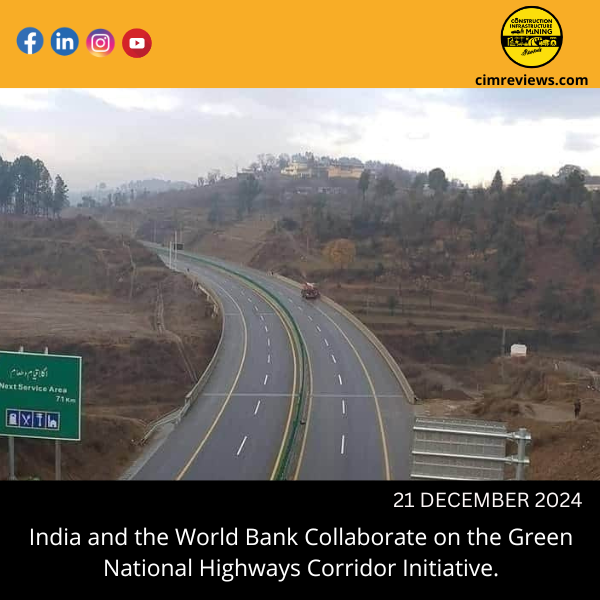The Government of India has signed an agreement with the World Bank to construct the Green National Highways Corridor Project (GNHCP) across 781 km in Himachal Pradesh, Rajasthan, Uttar Pradesh, and Andhra Pradesh. The project, with a total cost of $1,288 million (₹7,662 crore), includes $500 million in loan assistance from the World Bank.
The GNHCP aims to create safe, climate-resilient, and eco-friendly highways by integrating green technologies. Key features include the conservation of natural resources through cement-treated sub-base, reclaimed asphalt pavement, and the use of local and marginal materials like lime.
The guidelines of Indian Roads Congress on Green Highways (Plantation, Transplantation, Beautification & Maintenance) Policy, 2015 stipulates planting the plants/trees on National Highways as per the availability of space in Right of Way. Since promulgation of Green Highways Policy,.
465.42 lakh plants have been planted on the National Highways in the country. In Maharashtra, 40.17 lakh plants and in Madhya Pradesh, 43.53 lakh plants have been planted from 2015-16 to 2024-25 (till 15 November, 2024). fly ash, and waste plastic. Bio-engineering methods, such as hydroseeding and the use of coco/jute.
In December 2020, the Government of India and the World Bank signed a $500 million agreement to develop the Green National Highways Corridor Project (GNHCP). This initiative aims to construct 781 kilometers of highways across Himachal Pradesh.
Key Objectives of the GNHCP:
- Enhanced Road Safety: By integrating safety features into the highway designs, the project seeks to reduce traffic accidents and improve overall road safety for users. Rajasthan, Uttar Pradesh, and Andhra Pradesh, focusing on integrating safe and green technology designs. fibers for slope protection, are also being incorporated to mainstream sustainable construction practices.
- Capacity Building: The GNHCP will strengthen the Ministry of Road Transport and Highways’ (MoRTH) ability to mainstream green technologies and safety measures into future highway projects. Demonstrate the effectiveness of green and safe highway designs, serving as a model for future infrastructure projects in India.
Financial and Implementation Details:
The total project cost is estimated at $1,288.24 million (approximately ₹7,662.47 crore), with the World Bank providing a $500 million loan to support the initiative. The remaining funding will be sourced from the Government of India. The project is set to be implemented over a period of six years, focusing on the identified states.
Expected Outcomes:
- Enhance connectivity and promote economic development in the participating states.
- Contribute to India’s commitments toward sustainable development and climate change Upon completion, the GNHCP is anticipated to mitigation.
The Government of India and the World Bank are collaborating on the Green National Highways Corridor Initiative (GNHCI) to develop environmentally sustainable highway infrastructure. This initiative friendly practices, and climate resilience into India’s expanding road network.
Project Overview
The World Bank has extended financial and technical support for the initiative, focusing on building climate-resilient highways across key states, including Rajasthan, Himachal Pradesh, Uttar Pradesh, and Andhra Pradesh. The project covers the development of over 781 km of national highways, incorporating sustainable practices to minimize environmental impact.
Key Features of GNHCI
- Use of Green Technologies: The initiative promotes the use of recycled materials, bio-engineering solutions, and solar energy in highway construction and maintenance.
- Carbon Footprint Reduction: Adoption of energy-efficient construction techniques and tree plantations along highways will help absorb carbon emissions.
The Green National Highways Corridor Initiative is expected to enhance connectivity, reduce vehicular emissions, and improve road durability while creating employment opportunities in the green construction sector. It aligns with India’s commitment to reducing carbon emissions by 45% by 2030, as part of its global climate commitments.
Group Media Publication
Construction, Infrastructure and Mining
General News Platforms – IHTLive.com
Entertainment News Platforms – https://anyflix.in/





